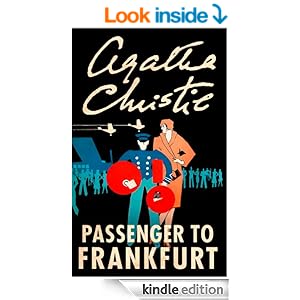- originally published in 1970
- this edition the Hamlyn Agatha Christie Crime Collection, published 1971
- 174 pages
- source: from my own shelves
A middle-aged diplomat is accosted in an airport lounge and his identity stolen…
Sir Stafford Nye’s journey home from Malaya to London takes an unexpected twist in the passenger lounges at Frankfurt – a young woman confides in him that someone is trying to kill her.
Yet their paths are to cross again and again – and each time the mystery woman is introduced as a different person. Equally at home in any guise in any society she draws Sir Stafford into a game of political intrigue more dangerous than he could possibly imagine.
In an arena where no-one can be sure of anyone, Nye must do battle with a well-armed, well-financed, well-trained – and invisible – enemy…
My take
Written late in Agatha Christie's career, this story begins with an introduction from the author in which she talks about where her ideas come from. If you click on the image above you will be taken to Amazon where you can read it for yourself.
It gives an interesting insight into the way Agatha Christie thought. She says that the ideas for the story and the characters are her own, but that the setting is usually real, somewhere she has been, and the action for the story may come from something she has observed or read in a newspaper.
In her own words - Introduction: The Author Speaks
PASSENGER TO FRANKFURT was the last of Agatha Christie's stand-alone novels, written when she was 80, six years before her death. I think her readers at the time would mainly have been very disappointed in the novel, not so much in the standard of the writing, but in her preoccupation with the idea that evil powers are taking over the world. Of course she prepares us in a way in the Introduction, by saying "it is not an impossible story - it is only a fantastic one". She seems to be saying that if we look for the sort of events we find in the novel we will also find similar ones reported in our daily newspapers. What she has done is bring instances of them together.
 However the sort of paranoia she displays here has surfaced before in her "espionage" novels and in the preoccupation she showed with a controlling evil force behind European economies, or the idea of a master criminal who was controlling world events. So these fears are not new to Christie.
However the sort of paranoia she displays here has surfaced before in her "espionage" novels and in the preoccupation she showed with a controlling evil force behind European economies, or the idea of a master criminal who was controlling world events. So these fears are not new to Christie.I think she probably is reflecting what people of her age must have been thinking in the late 1960s - is this what we won the Second World War for? A society of unrest, political upheaval, student protest, permissiveness, the collapse of the old social order, the rise of neo-Nazism?
However Agatha Christie is not Ian Fleming and she does not carry this sort of novel off at all well. It seems to degenerate into political polemic but the reader is not even really sure what side some of the characters are on. And then at the end there is a touch of romance!
It is the only one of her novels that I have nearly not finished. I was tempted to put it down several times, and from what I have read of other reviews, I am not on my own.
My rating: 2.0
I read PASSENGER TO FRANKFURT as part of my commitment to the Agatha Christie Reading Challenge: to read the novels of Agatha Christie in order of publication. By my calculation I've now read 62 novels and have 5 to go.


4 comments:
Kerrie - No, you're not. The first part, where Stafford Nye loses his passport, etc., goes just fine. But the rest....no, definitely not up to Christie's ability at all.
No, you are certainly not alone in your assessment. I thought this was the worst AC by far with plot points lurching from one lecture to another. Didn't finish listening to this on audiobook...
I agree - not one of her best books. And sadly of the five you have left to read three of them aren't any better. Only the last two, which were written much earlier and published later are good, which is a good note to end on.
Not read this one yet, I'm still in the 1930s.
Post a Comment